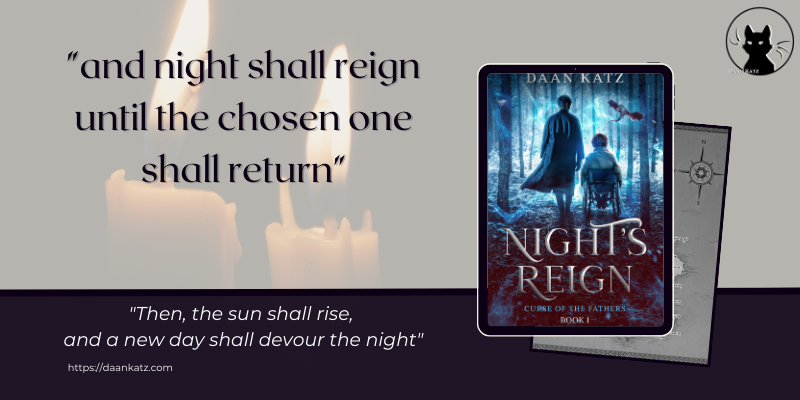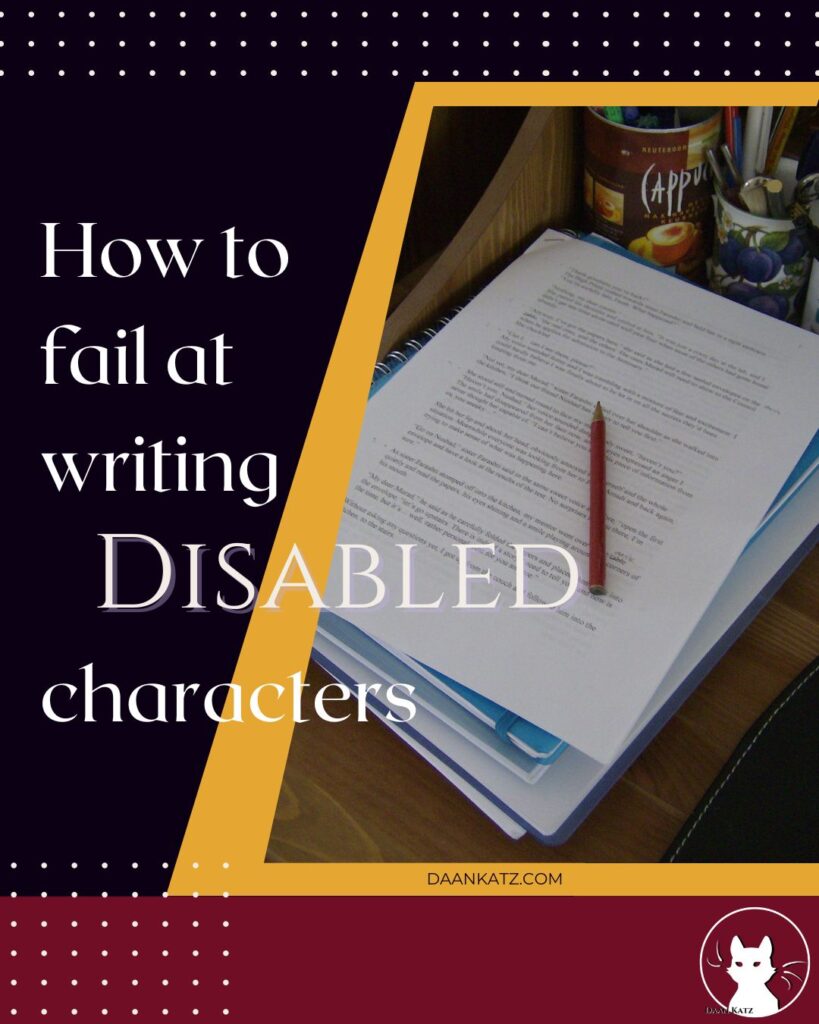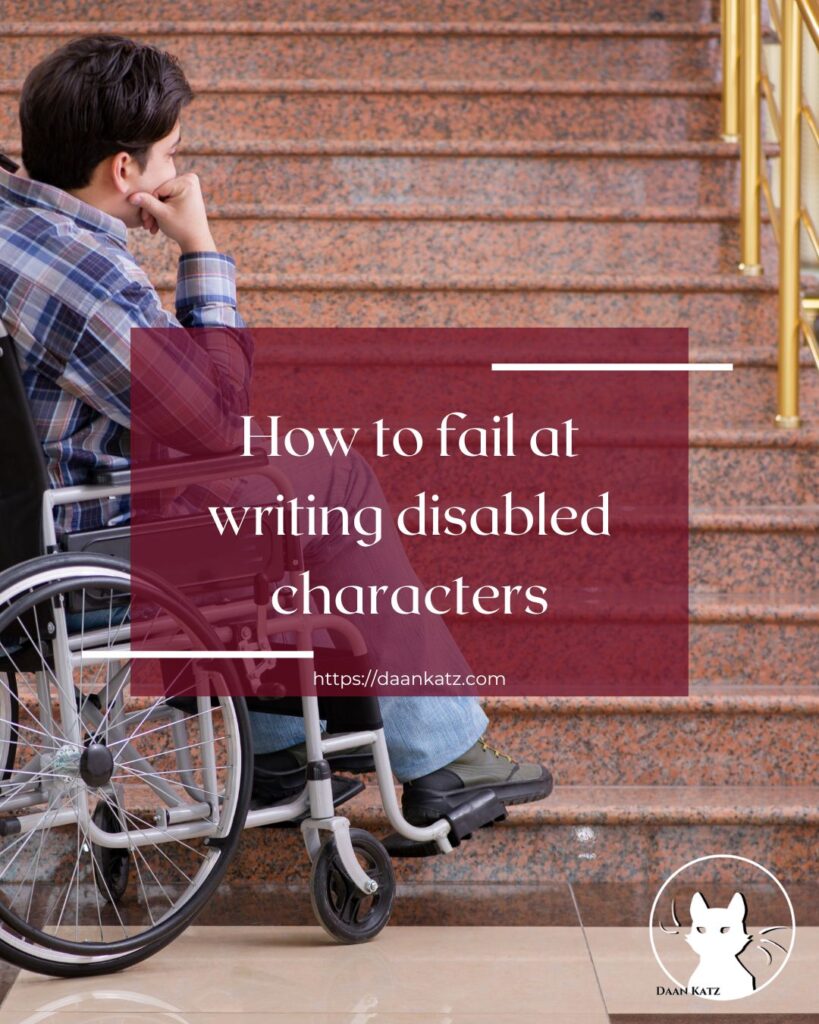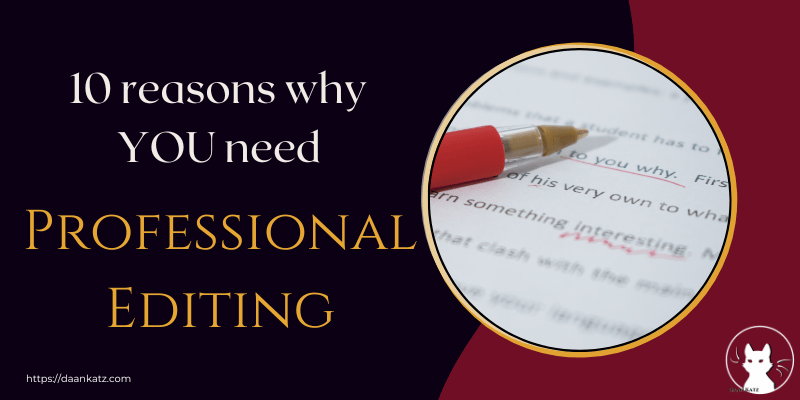If you’re reading this post, you are probably a writer who wants to know how to write disabled characters, and write them correctly and believably. Super! You’ve come to the right place! As a disabled author myself, I’m confident I can answer a lot of your questions about the dos and don’ts of writing disabled characters.
Table of Contents
However, before diving into the issue on how to write awesome disabled characters, we first need to explore how NOT to write them. That’s what this post is all about.
With that out of the way, let’s get down to business.
The Importance of Authentic Representation
Although it’s commendable that more and more authors these days are willing to write about disabled characters, I think it’s important to recognise that not all representation is good.
Unfortunately, there are many stereotypes out there about disability and the disabled. Stereotypes that are not easily broken. What’s worse, many people don’t even realise they have been fed inaccurate information, and it never occurs to them to question the lies they believe in. These false beliefs, in turn, make them treat us inappropriately—not because they are out to hurt us, but because they don’t know any better.
So what we really need is proper, authentic representation. And stories are the perfect vehicle to do just that.
Token Disabled Characters
You’ve heard of token characters, I’m sure, so I won’t go too much in depth here. Suffice it to say that a token character’s only purpose in a story is so the author can point out how inclusive they are.
Well, sorry to burst your bubble, but if you’re doing that, it’s definitely not going to make you look good. At all. Do I really need to tell you how dismissive and offensive this approach is, and how completely it undermines the goal of genuine representation?
That said, let’s have a quick look at the most common types of disabled token characters.
- The Inspirational Cripple: This character’s sole purpose is to inspire others with their bravery and determination. Their disability is portrayed as a tragic challenge they heroically defeat, not as an intrinsic part of their identity. They’re just symbols of inspiration, not fully formed characters.
- The Dependent Sidekick: This disabled character serves as a sidekick to the able-bodied protagonist. This character relies on the protagonist and reinforces the negative stereotype of disabled people being helpless or burdensome.
- The Disabled Martyr: This character’s disability is a constant burden, and their story revolves around their suffering. They may very well die or experience significant tragedy because of their disability. This perpetuates the notion that disabled lives are inherently tragic.
- The Superpowered Disabled: The character’s disability gives them remarkable abilities or powers. This scenario commonly plays out in a magical or fantastical setting. While having unique abilities can be empowering, reducing a disability to a plot device is disrespectful.
The bottom line is this: If you’re only including a disabled character because it’s the “woke” thing to do, please don’t bother. We’re not here to make you feel better about yourself.
The Tragic Disabled Character
I know, I know. Disability is a total tragedy. It’s a miracle how any disabled person can lead a happy and fulfilling life, right? At least, that’s what this trope would have us believe.
So far, I’ve seen two variations on this trope in action:
- I’m so miserable, I want to die
- I’m so miserable, I need to find a cure
Let me die
We’ve seen a rather ugly example of this trope in action in JoJo Moyes’ highly popular “Me before You”.
Let me cite one paragraph from the blurb:
“Will Traynor knows his motorcycle accident took away his desire to live. He knows everything feels very small and rather joyless now and he knows exactly how he’s going to put a stop to that.”
And that would all be good and well, if somewhere during the story there would have been a turning point. One where Will went from being deeply unhappy with his life to realising that, despite his disability, life still has plenty to offer.
But that doesn’t happen, and in the end Will takes his own deeply tragic life. Oh, yes, I think Ms Moyes calls it euthanasia, but whatever. It angers me. Not because the assisted suicide per se, but because of the reason for it: his disability.
That is just not cool. It’s dehumanising, reductive and disrespectful. Being disabled is no more of a tragedy than being born.
Cure me
Another variation on this trope is the Magic Cure. I recall watching a superhero series a couple of years ago, either by Marvel, DC, or Warner Bros (I honestly can’t remember; nor do I remember which series it was), where one of the core characters got injured and paralysed. So far, so good. But then… a few episodes later she miraculously regained the ability to walk.
A more recent example is Yennefer from “the Witcher”, who was born with kyphosis and has her deformity magically cured.
Really? Was it necessary that these characters got cured from their disabilities? I daresay not. Was it really too hard to write a disabled character that totally kicks arse?
FFS, don’t turn us into deeply tragic characters because of our disability. If you really have to turn us into tragic characters, do it for a good reason. Disability is not a good enough one.
The Impact of Killing Disabled Characters
While you may not think it’s such a great deal to kill off disabled characters—after all, don’t we writers kill innocent characters all the time?—this is more problematic than it might seem at first glance.
The problem is, when you kill off a disabled character because of their disability, you are basically perpetuating and validating Hitler’s message that the disabled are “marginal human beings”, “unworthy of life”.
Honestly, I’m not saying you cannot ever kill off a disabled character. You can, and you should, if the story needs it. The same rules apply to all fictional killings.
Just don’t make your disabled character take their own life because they can’t bear the tragedy of being disabled.
Alternative Plotlines
But, Mr Katz, you say, when you take all those possibilities away, there’s nothing left for me to write about. I might as well give up on trying to write disabled characters.
I disagree. Any writer worth their salt should be able to come up with creative ways to incorporate disabled characters in their stories in a way that feel authentic and truly representative.
In my novel “Night’s Reign” my male protagonist, the autistic priest Niels Bosch, sets out on a quest to confront the man who has been scheming to kill him for nearly twenty turnings (the equivalent of our earthly years). On this quest he is accompanied by his wheelchair dependent cantor, Beldenka Nadinov, and two trusted friends, one of whom is an amputee.

None of them die—although Niels comes close, not once, but several times—and in the end they do exactly what they set out to do. What we get here is this: four capable individuals, working together to achieve a goal. Although we see throughout the narrative how their disabilities impact their lives, the story is not about their disabilities.
Disability as an Aspect of Diversity
When you stop to think about it, it’s quite simple. Disability is a fact of life. We cannot and should not close our eyes to that reality, and we shouldn’t try to erase it. Neither in real life, nor in stories. Instead we should include disability in our fictional accounts with the same care as we include any other story elements.
Let the many faces of disability show. Portray your disabled characters with the same depth as you would any other character. It really is that easy.
Disability Acceptance and Empowerment
For many disabled people, myself included, acceptance is not a passive surrender to circumstance, but rather an active choice. It’s not always easy, and it doesn’t happen overnight, but once we have chosen to accept our disability we have unlocked the key to true happiness. Our disability has now become a part of our identity and we have no need for any magic cures. Nor do we wish for death to take us.
This does not mean we are always smiling and flitting through life with no care in the world. We will still have our moments when we grieve for what we have lost—or even for the things we were never given in the first place. But we don’t get stuck in our sorrows. Because life is still good, and we won’t allow our temporary troubles to bring us down.
Unconscious Bias
If you’re even a bit like me, you would like to believe that you are a good person. Fair, and free of prejudice.
Sadly, the truth is, we all carry implicit biases with us. Me too. We don’t have those biases because we are bad people, but simply because they are ingrained in our subconscious. What your implicit biases are, is largely determined by personal experiences, upbringing, and the media. The thing about unconscious biases is, we are not aware of them, which makes it hard to change them.
The good news is, we can become aware of our own unconscious biases. It takes effort and the willingness to look at the world with fresh eyes, but it can be done.
To take an example from my own life, I was never aware of how wheelchair unfriendly our society is—until I became wheelchair dependent myself. Suddenly, I noticed all those little things that never used to bother me before.

Narrow, winding, cobbled roads. Inaccessible shops. The lack of accessible loos. The way people look at you when you’re in a wheelchair. The way they avoid looking at you. The countless microaggressions. (“You’re too young to be in a wheelchair”, or, “You are so brave! I could never live like that.”)
Research and Consultation
Thankfully, there’s a lot a writer can do to avoid making the most costly mistakes when writing a disabled character.
First and foremost, it really helps when you are yourself disabled, but I won’t suggest you go out of your way to become disabled just for the sake of writing a story.
Instead you should focus on doing your research. And don’t just read up on the topic. Go talk to experts in the field. Speak with disabled people, esp. with those who have the same disability as your character.
And, once you have finished your first draft, or maybe after your work has gone through a round of beta reading and/or developmental editing, find a sensitivity reader. Even better, ask a few of them to read your manuscript and provide you with feedback.
Last but not least
Read my novel Night’s Reign. It can help you get a better feel for how to write disabled characters. The book portrays characters with physical, developmental, and mental disabilities. I didn’t specifically set out to include so many disabled characters, BTW. They just showed up like that, and I simply followed their leads. Because that’s how I roll.
Want to get a little preview of Night’s Reign first? No problem, I’ve got you covered. Download this FREE E-book with 10 quotes from Night’s Reign.

Oh, and don’t forget to come and say hi on Facebook, Instagram, or Twitter!





